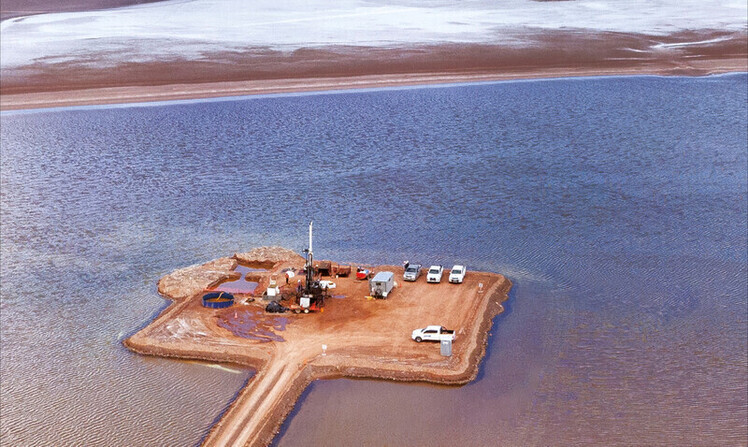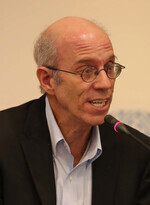hankyoreh
Links to other country sites 다른 나라 사이트 링크
[Column] The mineral rush


By John Feffer, author and co-director of Foreign Policy in Focus at the Institute for Policy Studies
Entrepreneurs and adventurers have long traveled the world in search of gold. European empires looted Latin America for its silver and tin. Diamonds attracted the rapacious to Africa. Oil has built enormous empires of wealth in the Gulf states.
Today, an entirely different scramble for natural resources is taking place. These “critical raw materials” play an increasingly important role in the transition away from fossil fuels that virtually every country in the world is now prioritizing. Such minerals include the lithium that’s essential to the lithium-ion batteries in electric vehicles, the cobalt that’s part of the magnets used for wind turbines, and the rare earth elements that play a key role in solar panels.
South Korea is heavily dependent on these raw materials for its burgeoning electric car production, its semiconductors, its solar panels and wind turbines. In Pohang, once known primarily for its steel, the Korean government is building a “battery city” that will put South Korea at the very center of the clean energy transition. But to make these batteries — at least the current lithium-ion type — will require even greater inputs of lithium.
To date, South Korea has depended on China for 58 percent of its lithium (as well as 64 percent of its cobalt and 90 percent of its rare earth elements). But sourcing from China comes with a special complication. US buyers of electric cars will only get a tax rebate if they buy cars made in the United States with components sourced domestically or from its allies with free trade agreements.
Well, South Korea has a free trade agreement with the United States, so what’s the problem? A recent “guidance” from the Treasury Department that clarifies provisions in the Inflation Reduction Act requires the allied country to source at least 40 percent of the minerals for its batteries from outside non-US allies like China (rising to 80 percent in 2027).
If Hyundai or Kia wants its US-manufactured EVs to be competitive in the US market, they will have to reduce their dependence on China for the lithium in the batteries. If the companies in Pohang want to sell their batteries to US-made EVs, they too will have to find new sources for the mineral components.
That explains why the Korean government dispatched a delegation to Latin America last month, specifically Chile and Argentina where a large amount of lithium is mined. Until someone comes up with a commercially viable alternative to the lithium-ion battery — and there are several options on the horizon — every major country that wants their “clean energy” products to compete in the US and global markets is lining up to get a cut of Latin American lithium.
The European Union is currently debating a critical raw materials act that tries to reduce mineral dependency on China. Like South Korea, the EU is boosting efforts at “urban mining,” which means extracting minerals from used batteries and the like. It is also trying to expand mining on its own territory. But it is also aggressively courting mineral-rich countries in the Global South.
The United States is attempting to do the same. It, too, is pouring billions of dollars into new battery production and new sourcing for mineral components. It has also restarted what had once been the largest rare earths mine in the world at Mountain Pass in a remote part of California and is exploring other new mines elsewhere in the country.
There are several major problems associated with this new rush to acquire critical raw materials. First of all, there’s just not enough to go around. The earth doesn’t contain enough lithium that we can access for all combustion vehicles to switch to battery-powered ones. Nor are there enough rare earth elements indium and neodymium to build all the solar panels and wind turbines that would be needed to replace oil and natural gas.
This relative scarcity is fueling the desperation in industrial countries. Whoever can secure the greatest access to these raw materials will be the country best poised to profit from the switch away from fossil fuels. It also means that Global South countries in theory hold some very good cards in this global poker game. But these countries haven’t yet figured out a way to leverage those riches — safely, sustainably — to improve their position in the global economic pecking order (as South Korea has done).
A second problem is environmental. The mining of these minerals causes considerable damage to the environment. The mining and processing of lithium, for instance, draws heavily on water resources in dry areas like the “lithium triangle” where Argentina, Bolivia and Chile all converge. Rare earth minerals contain radioactive materials that pose a risk to workers and surrounding communities.
A third problem is the neo-colonial nature of the relationship between northern manufacturers and southern suppliers of raw materials. In the colonial era, Japan basically plundered Korea for its rice and iron. Today, industrialized countries are trying to extract lithium and other critical raw materials at the lowest possible prices through concessions built into free trade deals that eliminate or lower tariffs.
These trade agreements are also designed to make it more difficult for Global South countries to pursue industrial policies that could build strong next-generation industries to compete with those in the Global North. In other words, the Global North is kicking away the ladder that South Korea used to climb to prosperity.
What are the alternatives to this new hyper-market in critical raw materials?
One thing that South Korea is doing right is prioritizing the recycling of materials and investments in research into alternatives that don’t rely on expensive and rare minerals.
But South Korea and other countries in the Global North face a more basic problem. Rich countries — and the richest inhabitants of those countries — are consuming beyond the means of the planet. The “clean energy transition” is just a band-aid on the deeper problem of resource depletion and biodiversity loss. Richer countries have to learn not just how to use less oil, natural gas, and coal, they have to learn how to use less energy overall.
Climate change is an emergency. There is no question that the world must reduce carbon emissions as quickly as possible. But this decarbonization must be done equitably and with a minimum of additional planetary pollution. The latest mineral rush can indeed be an opportunity to redress historic wrongs and reexamine the economic growth model that got us into this emergency in the first place.
Please direct questions or comments to [english@hani.co.kr]

Editorial・opinion
![[Column] Has Korea, too, crossed the Rubicon on China? [Column] Has Korea, too, crossed the Rubicon on China?](https://flexible.img.hani.co.kr/flexible/normal/500/300/imgdb/original/2024/0419/9317135153409185.jpg) [Column] Has Korea, too, crossed the Rubicon on China?
[Column] Has Korea, too, crossed the Rubicon on China?![[Correspondent’s column] In Japan’s alliance with US, echoes of its past alliances with UK [Correspondent’s column] In Japan’s alliance with US, echoes of its past alliances with UK](https://flexible.img.hani.co.kr/flexible/normal/500/300/imgdb/original/2024/0419/2317135166563519.jpg) [Correspondent’s column] In Japan’s alliance with US, echoes of its past alliances with UK
[Correspondent’s column] In Japan’s alliance with US, echoes of its past alliances with UK- [Editorial] Does Yoon think the Korean public is wrong?
- [Editorial] As it bolsters its alliance with US, Japan must be accountable for past
- [Guest essay] Amending the Constitution is Yoon’s key to leaving office in public’s good graces
- [Editorial] 10 years on, lessons of Sewol tragedy must never be forgotten
- [Column] A death blow to Korea’s prosecutor politics
- [Correspondent’s column] The US and the end of Japanese pacifism
- [Guest essay] How Korea turned its trainee doctors into monsters
- [Guest essay] As someone who helped forge Seoul-Moscow ties, their status today troubles me
Most viewed articles
- 1[Column] The clock is ticking for Korea’s first lady
- 2Samsung barricades office as unionized workers strike for better conditions
- 3After 2 months of delayed, denied medical care, Koreans worry worst may be yet to come
- 4[Correspondent’s column] In Japan’s alliance with US, echoes of its past alliances with UK
- 5[Column] Has Korea, too, crossed the Rubicon on China?
- 6Hong Se-hwa, voice for tolerance whose memoir of exile touched a chord, dies at 76
- 7[Editorial] When the choice is kids or career, Korea will never overcome birth rate woes
- 8Constitutional Court rules to disband left-wing Unified Progressive Party
- 9Nearly 1 in 5 N. Korean defectors say they regret coming to S. Korea
- 10‘Right direction’: After judgment day from voters, Yoon shrugs off calls for change